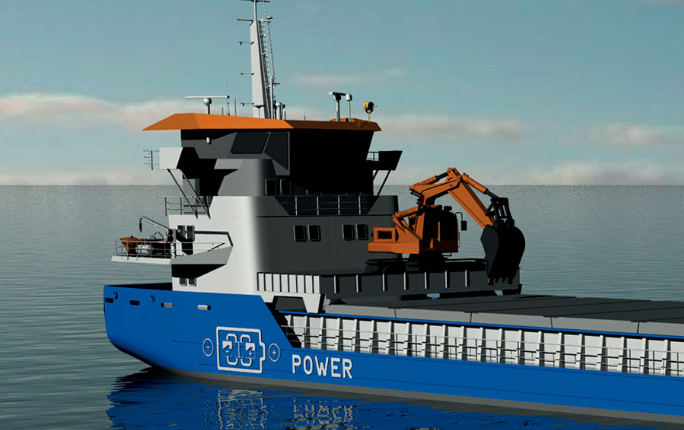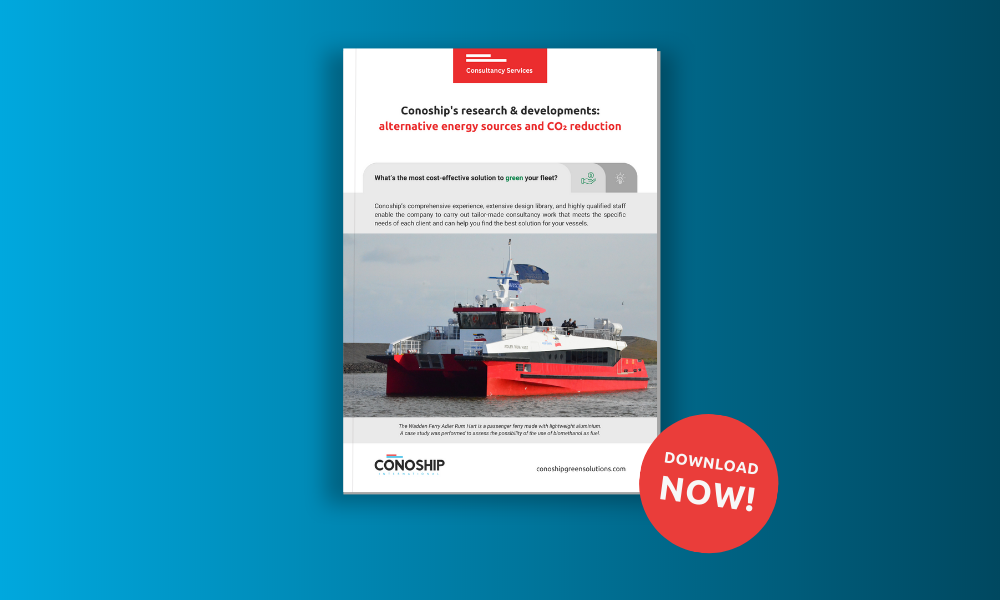In the spotlight 2/4: Conoship’s Research & developments on alternative energy sources and CO₂ reduction
Conoship’s comprehensive experience, extensive design library, and highly qualified staff enable the company to carry out tailor-made consultancy work that meets the specific needs of each client and can help you find the best solution for your vessels.
The shipping sector accounts for 90% of the world’s freight transport and is the most ‘climate-efficient’ and cost-efficient way of transporting goods. The fuel consumption and CO₂ emissions per ton of transported cargo are between 100 and 1,000 times less than for cargo transported by road transport, and even more for aircraft transport. The global carbon emissions associated with it are only 3% of the world’s total.
International shipping is necessary and will continue to play a major role in our freight transport in the future. With the continuous development of energy-efficient ships, emission reduction and propulsion technologies, and even zero-emission ships, the shipping industry is well on its way to achieving the United Nations International Maritime Organization’s (IMO) net zero emissions by 2050. International shipping accounts for 2-3% of global carbon emissions. IMO’s strategy for the reduction of Greenhouse Gas (GHG) emissions from ships requires that total annual GHG be reduced by at least 50% by 2050 compared to 2008.
In the previous article published, you read about consultancy studies where the analytical and independent view of Conoship International helped to improve upcoming rules and regulations. In this second article of a series of four, Conoship shares more details about the projects we are involved in regarding CO₂ reduction and alternative energy sources.
How can we help you?
To stay at the forefront of developments in Maritime Technology and to apply the latest innovations, Conoship has a strong focus on research and development. The company’s goal is to spot, develop and create new knowledge, innovations and possible applications for the Maritime Industry to provide clients with the best possible solutions.
| Curious or need some maritime expertise? Contact us to discuss what we can achieve together!
Conoship provides a future-proof solution and creative input so our clients can respond to a fast-changing regulatory framework. Get to know more about Conoship’s last developments and projects using alternative energy sources and CO₂ reduction research:

The Wadden Ferry Adler Rum Hart is a passenger ferry made with lightweight aluminium. A case study was performed to assess the possibility of the use of biomethanol as fuel
How to start using alternative energy sources
When it comes to alternative energy sources, Conoship has initiated and is involved in several types of research, to enable shipping to remain the biggest and one of the greenest players in future transport. Regardless of whether you are looking to update your existing fleet or you trying to build a new fleet, we have the right solution for your business. Conoship invests in studies about sources of energy that do not come from fossil fuels and thus produces little to no greenhouse gases like CO₂. This means that energy produced from alternative sources does not contribute to the greenhouse effect that causes climate change. In this article, you can check a few examples of how our services can be combined to guide projects to a progressive future-proof outcome. Our experts can advise you on how you can greener your fleet or how your new fleet can sail carbon-free.
How to reduce shipping’s CO₂ emissions
Conoship is an active partner in projects that aim to reduce shipping’s CO₂ emissions, always focused on the integration of techniques and looking at the whole picture to understand the challenge and go for better solutions. Accordingly to Research Department Manager Harald Rügebregt,
“There are several ways to solve the CO₂ reduction challenges as a ship design company, but the main thing is probably to focus on energy-efficient ships, because, on top of everything, they save you money.”
Conoship’s in-house teams of naval architects and mechanical and structural engineers are driven to realize the most challenging designs and develop the best possible concept. To solve the CO₂ reduction challenges Conoship’s consultants have in-depth experience in the following solutions:
Wind propulsion
Conoship is a partner to eCONOwind, which is a company fully dedicated to wind-assisted ship propulsion that provides high fuel savings due to modern aerodynamics and optimum design. With the eCONOwind©-unit, the thrust of the propeller can be reduced to maintain the same speed. Depending on vessel type, this leads to fuel savings and 10 to 30% emission reductions. The eCONOwind©-unit can be very easily retrofitted on existing vessels, especially if container fittings are available on deck or hatch covers, or otherwise on a dedicated foundation. For new vessels, Conoship can integrate eCONOwind©-units (or individual VentiFoils) in the design, with dedicated positions. Learn more about solutions regarding wind-assisted propulsion.

Conoship International Projects (CIP) developed an innovative, future-proof and environmentally friendly 3600 TDW general cargo vessel, suited for sea-river operations. This vessel can be considered the new standard for low-air draught sea-river coasters
Full electric propulsion and batteries usage
To enable electricity on board, Conoship uses a battery where energy is stored in liquid form: the Redox flow battery. It’s a safe and 100% emission-free technique which does not depreciate during its lifetime. All energy in the battery can be used for the propulsion of the ship.
The effectiveness and environmental benefits of this solution are enhanced because the battery contributes to the ship’s ballast, rather than the current water ballast systems.
Fuel innovations will continue to follow one another in the coming years, even during the economic lifetime of a ship. Modular thinking, adaptive engine design and construction make it possible for the vessel to remain viable during its life cycle. Emission reductions during the lifetime can be accelerated if combinations of successive possibilities are taken into account in each new design, learn more.

Design with easy conversion in mind and become future fuel ready today
Electric Hybrid Battery Solution
The vessel Coastal Crown was developed in close cooperation with the shipyard Bijlsma Wartena and the owner Acta Marine to become the most sustainable workboat at the moment in her market. Conoship has provided the complete naval architecture, basic structural and diagram design as well as detailed construction and piping engineering.

Equipped with Tier III engines and a 300kWh battery package for both propulsion and the ship’s accommodation resulting in up to 15% reduction in fuel and CO₂ emissions and 73% in NOₓ emissions
Research on methanol-fuelled ships
Conoship designed the Adler Rum Hart, a passenger ferry made with lightweight aluminium. Accordingly with Redmer van der Meer, Concept Designer & Hydrodynamic Specialist at Conoship International:
“The Wadden Ferry Adler Rum Hart is one of the projects I’m most proud of. The design is innovative, compact, fuel-efficient, lightweight and follows the owners’ requirements. The vessel was designed according to the strictest environmental standards, minimizing ecological impact. It is also very rewarding to see that the ferry provides a good experience for the passengers”.
The innovative hull of the catamaran was designed and optimized to reduce ship resistance, keeping fuel consumption to a minimum. After carefully considering the options and their related limitations, methanol was the most suitable and future-proof fuel chosen for this case study.
Methanol is an interesting transition fuel option that gives a considerable reduction in emissions. Is usually recommended for small to medium size (cargo) vessels. It is considered by many maritime transportation companies as “the fuel of the future” since you can obtain it from the remains of agriculture and wood production. Learn more about Conoship’s solutions regarding bio-methanol.

Conoship is participating in the EverLoNG project, which aims to encourage the uptake of SBCC by demonstrating its use on LNG-fuelled ships. The company is also contributing to LNG-Zero, a research project that aims to develop technology and strategy that are needed for reducing exhaust emissions to contribute to a sustainable shipping industry, as a part of the Dutch Maritime Master Plan.
Conoship is specialized in defining the crucial design requirements and finding the most optimal compromise between conflicting requirements. The company moulds ideas into a design that can be built, is profitable, safe, and meets all regulations. With experience in complex and well-structured projects, research, developments and solutions Conoship is heading towards a zero-emission shipping future.
Download here our complete whitepaper on this subject.
| Curious or need some maritime expertise? Contact us to discuss what we can realise together!





